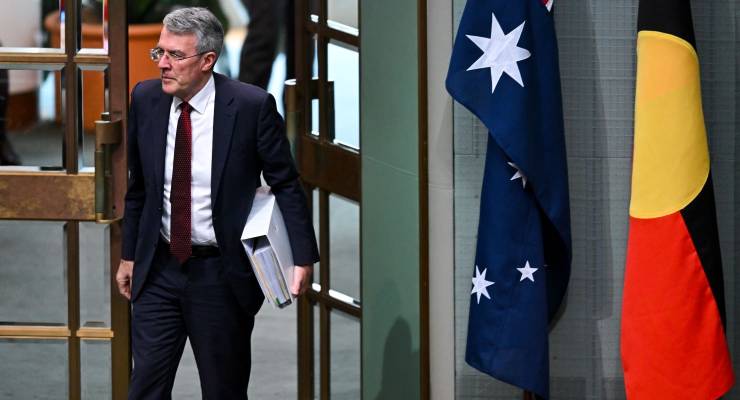
Attorney-General Mark Dreyfus is proposing to reverse years of expansion of Commonwealth secrecy laws with a new general secrecy law for public servants and those working with the Commonwealth, and the repeal or curtailment of scores of secrecy laws that have proliferated under transparency-averse governments.
The commitment comes after a detailed review of all Commonwealth secrecy laws by the Attorney-General’s Department (AGD), commissioned by Dreyfus, which made a suite of recommendations to reduce and unify the panoply of secrecy restrictions operating across departments and agencies.
What’s fascinating about the review is that the AGD, for years the bane of transparency, media freedom (and, really, basic liberties), has under Dreyfus shifted gear to push for the rolling back of some secrecy provisions and the establishment of core principles to guide future legislation — in the teeth of opposition from other departments.
When the Australian Law Reform Commission reviewed secrecy laws in 2009 — a review on which the AGD draws heavily — there were 506 secrecy provisions across Commonwealth legislation. Now there are 875. While many relate to personal information rather than information that may embarrass politicians, the expansion includes the Coalition’s dramatic hardening of secrecy provisions in response to the embarrassment caused by the revelations of the misconduct of Australian intelligence agencies by Edward Snowden.
Dreyfus proposes to implement a number of recommendations from the review:
- Around one in five secrecy offences will be stripped of their criminal liability in line with the AGD approach that offences should be proportional to the harm caused and that civil and administrative penalties are often more appropriate;
- A new general secrecy offence will be added to the Criminal Code Act relating to disclosures by Commonwealth officers and others working with the Commonwealth (e.g. covering the PwC tax leak). It would relate to circumstances where “disclosure would be prejudicial to the effective working of government or where the information was communicated to them in confidence and the disclosure would breach that confidentiality obligation”, but the definition of “effective working of government” would preclude prosecuting leaks merely because they cause embarrassment to the government. Once the new offence is legislated, departments will be required to identify superfluous secrecy provisions in their legislation for repeal;
- Wider access to a public interest journalism defence, which is available only under a small number of provisions;
- Enshrining 12 principles to guide secrecy laws. The first would be that secrecy laws are enacted only where there is “an essential public interest that requires criminal sanctions”, “noting that there is a high threshold for determining whether a public interest is sufficiently important to be deemed ‘essential’ “;
- Formalising the existing requirement for the attorney-general’s consent for prosecutions of journalists under secrecy provisions;
- The overly broad 2018 Coalition amendments to secrecy laws (which upped jail sentences to 10 years) will be allowed to lapse at the end of next year.
It’s clear from the review that many departments are hostile to any effort to reduce the level and severity of secrecy provisions. They prefer to retain their bespoke secrecy laws, want to avoid having to prove harm arising from a disclosure in court, want laws to apply as widely as possible (including to people not working for the Commonwealth) and want to block defences such as that information is already in the public domain. Some oppose a public interest journalism defence in relation to any national security information.
The AGD rejected the argument from departments that ordinary citizens should be treated the same way as public servants.
One vexing issue unaddressed is the definition of “cause harm to Australia’s interests”, a phrase used across a variety of secrecy provisions. Those interests include international relations, which are defined under the National Security Information (Criminal and Civil Proceedings) Act 2004 as including economic relations. That opens the door for governments to engage in conduct such as bugging the Timor-Leste cabinet room to benefit Woodside, or spy on Indonesian trade negotiators to assist US companies.
The review doesn’t examine the drift of “economic relations” towards “corporate interests”, but wants the review of the NSI Act by the independent national security legislation monitor (Grant Donaldson SC, who is making way for Professor Jake Blight in the role this week) to look at how “cause harm to Australia’s interests” is defined. That review is due out shortly, so we’ll find out Donaldson’s view on the definitional issue before too long.
The proposed changes won’t satisfy transparency advocates but do represent a significant change of mindset from that of the Coalition, which never saw a leak it didn’t want prosecuted (except if ministers themselves leaked) — harassing any whistleblower, journalist or lawyer who dared to embarrass them. Dreyfus, in contrast, is continuing the steady build-up of transparency and whistleblower protections he began when attorney-general under the last Labor government.
As the opposition from other departments suggests, the reforms won’t make him especially popular with his colleagues, and the government will receive no credit from the media for the additional journalist protections. Still, it’s a rare moment when the tide of secrecy is halted.








Seriously? Two words derail Labor’s supposed commitment to fixing secrecy and whistleblower protection. “David McBride”.
I’m not seeing a huge benefit here, sure we can’t get thrown in jail, but we can still be sacked and fined into ruin. (Civil and administrative penalties)
Let us hope that Boyle and McBride get to benefit from this new direction. If not, the whole thing isn’t worth the paper it’s printed on, or the effort of holding the media release to announce its implementation.
“Yes, Minister”.
They won’t.
It isn’t.
It’s Dreyfus & NuLabor to a tee – Alternative Liberal Party.